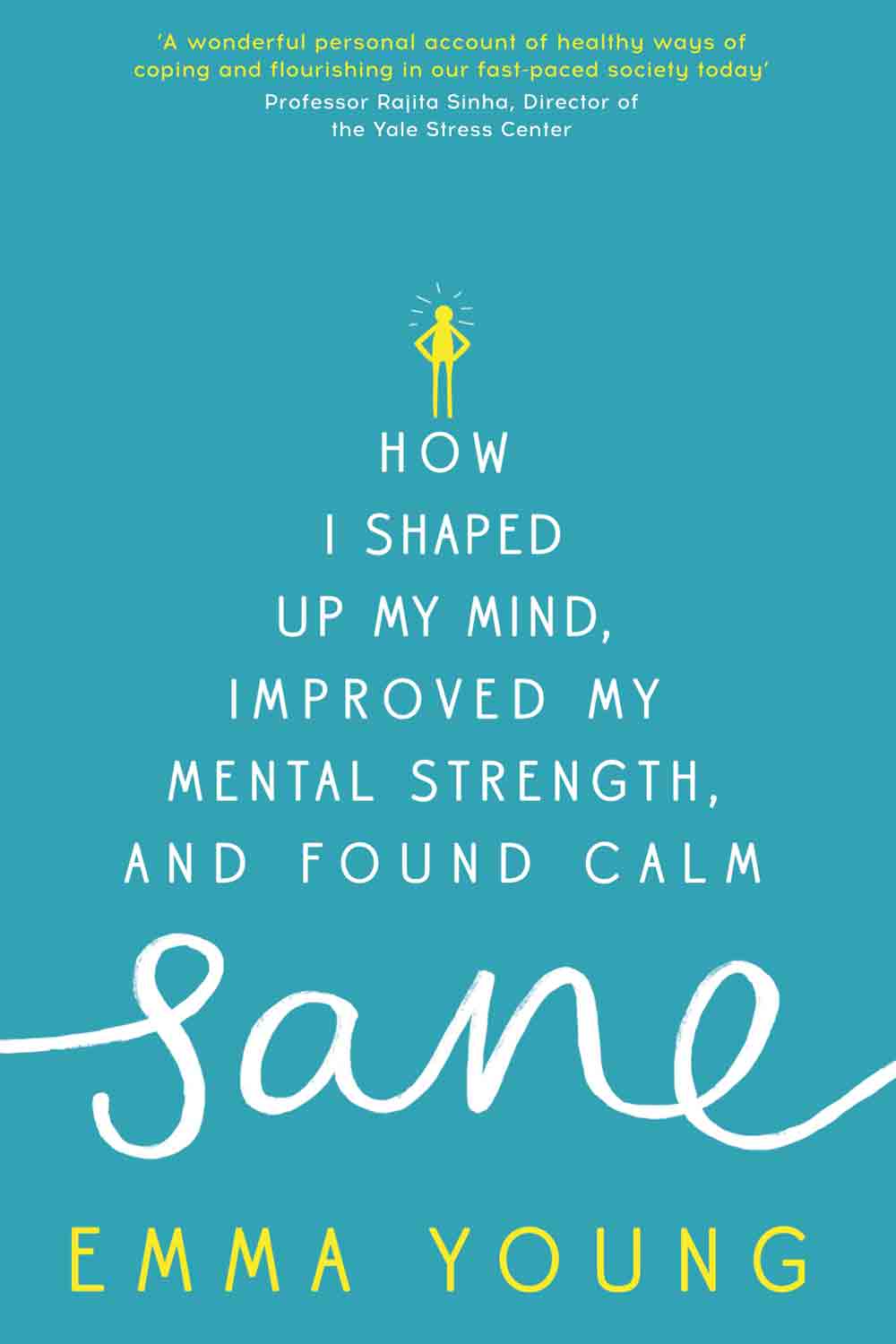Sane: Can You Tone Your Mind Just Like Your Body?
Sane by Emma Young offers readers a six-point plan to help improve your mental strength.

Celebrity news, beauty, fashion advice, and fascinating features, delivered straight to your inbox!
You are now subscribed
Your newsletter sign-up was successful
Sane by Emma Young offers readers a six-point plan to help improve your mental strength.
'I’ve never had a ‘proper’ psychological disorder. But my mind has always been all over the place', author Emma Young says.
'I often to used to lie awake worrying about things I couldn’t change - why didn’t I buy that flat, why did I leave that job? I set myself goals - like to exercise regularly and to cut out biscuits - and never stuck to them. I sometimes felt low for no obvious reason. And I lost my temper easily.'
Sound familiar? With news that Attention Deficit Disorder in young women is on the rise, and anxiety diagnosis growing too, Emma’s admission resonates. And her new book, Sane (£14.99; Yellow Kite) may well be the ‘wellness bible’ we’ve all been searching for.
'I decided I needed to take a systematic approach to strengthening my mind - to engage in a kind of mental boot camp', she says. 'I couldn't find anything like that out there, so I decided to develop one for myself. I have a degree in psychology and 20 years’ experience as a science and health journalist, so I had relevant skills to put to use.'
Sane is the result of a six-month journey for Emma. She traveled the globe, trawled through journal papers and met various people, from academics to a United States Marine, who believed that they could help her to tone up her mind, in the same way that you can tone up your body.
Emma then created a 'suite of 7 strategies' based on their recommendations, including meditation, changing her diet, exercising - and less well-known techniques such as stimulating the senses and mental toughness – and put each one to the test to discover 'what really works and what’s just headline-grabbing pseudo-science'.
Celebrity news, beauty, fashion advice, and fascinating features, delivered straight to your inbox!
'I feel an awful lot better than when I started out', she says at the end of the book. So, could Emma’s findings help you to improve your mental strength and find calm? Give her new life plan a go…

1.Try to exercise for 150 minutes a week
Why? Exercise stimulates the brain, helping us to feel more alert, boosts our mood, helps beat stress and distracts from over-thinking
'I’m not the least bit sporty, and I’d stopped exercising at 15', Emma says.
'So I felt a lot of trepidation about my plan to engage in moderate to vigorous exercise for a total of 150 minutes (2.5 hours) a week (the recommended amount for physical health). But I hadn’t counted, of course, on how good it would make me feel.
'Exercise makes me a lot calmer and really boosts my mental energy. I don’t always want to go to the gym - but I have stuck to my exercise regime - and that’s because of the benefits I feel, not the theory.'
Start by: 'Research shows that just a fifteen- to twenty-minute walk has a huge impact on how stressed or anxious you feel.'
2. Look at your diet
Why? While there’s no proven research that what you eat can make you anxious and depressed, faddy diets or those high in processed foods aren’t giving your body or brain the nutrients they need.
'I’ve cut out sugary snacks, eat a lot more fruit and vegetables, and don’t ever drink more than a single glass of wine – in a weekday evening', says Emma.
Start by: Sugar, caffeine, alcohol, chocolate and wheat are most likely to ruin your mood. Try cutting these out and see if your emotional stability improves.
3. Meditate at your desk
Why? Just 10 minutes of meditation is proven to improve your body’s ability to cope with stress.
'Meditation can feel like a luxury rather than an achievement', Emma says. 'But I remind myself that it has real benefits, and while I don’t do it every single day, I do it most days. I still find that guided apps help.'
Start by: 'Choose a short meditation that appeals to you, put on your headphones, close your eyes, and listen…the crucial bit is to try to let yourself focus on your body or your breathing, rather than your everyday thoughts.'
4. Teach yourself this simple mindful technique...
Why? Taking yourself out of a stressful or difficult situation for a few seconds can really help. The .be exercise is a grounding technique that calms the body.
'[.be is] a really simple technique', Emma says. 'But if you’re not familiar with mindfulness, it’ll help to think about this first: while we usually think of our focus as being inside our heads, we can shift it around our bodies.
'I’m really just talking about the focus of attention. Can you feel your toes? How do they feel? Are they warm or cold? Cramped or tingling? Now try switching attention to your breath: take a few seconds to feel the passage of air inside your nostrils or on the back of your tongue.
'Now you’re ready to try a .be. If you feel you’re starting to lose your temper or to panic, instantly drop your focus through your body to your feet (how do they feel), then lift it to your breath (how does it feel?) And that’s it. It sounds ridiculously simple, but it really helps me in a way that ‘count to ten’ just never did.'
5. Challenge yourself
Why? Mental toughness is a relatively new concept, but one which athletes use to overcome emotional limits.
'One of the most useful recommendations was to engage in episodes of "manageable adversity"', Emma says.
'The idea is to find challenges that push you out of your comfort zone, but not too far. Tackle something like this, and succeed, and it’ll improve your self-confidence, and ultimately help you to see pressure as something to be welcomed.
'The key here is to choose something that challenges you. I’d always avoided public speaking, so I started to say yes to every invitation to speak, instead of no. The first time, I was scared - and it was fine. The second time I found myself thinking, ‘why did I ever agree to do this?’ - and it was fine. Now I don’t worry about it. And I do feel it’s given me a more general confidence boost.'
Start by: 'If you’re engaged in something you’re finding challenging - whether it’s a run or a work project - don’t focus on finishing the run or getting the project completed, focus on the present, on what you’re doing right now to move towards achieving it.'
6. Boost your mood with music
Why? Music has an uplifting, calming effect, but new research also suggests it positively stimulates the brain in a different way.
'We all self-medicate with music', Emma says. 'But I used to use music very haphazardly. And I was never sure what might help best to boost my mood - should I avoid songs with sad lyrics, even if I liked the tune? Should I play classical music? Would that help?
'Then I found recent Canadian research concluding that while a song can trigger your brain’s reward centre, and so make you feel great, the same song certainly doesn’t do it for everybody - but whatever you like will do it.'
Start by? 'If you need a mood boost, play whatever you like, whether that’s Mozart or hip hop.'
Sane, by Emma Young, is available now in hardback and ebook, by Yellow Kite, priced £14.99.
The leading destination for fashion, beauty, shopping and finger-on-the-pulse views on the latest issues. Marie Claire's travel content helps you delight in discovering new destinations around the globe, offering a unique – and sometimes unchartered – travel experience. From new hotel openings to the destinations tipped to take over our travel calendars, this iconic name has it covered.